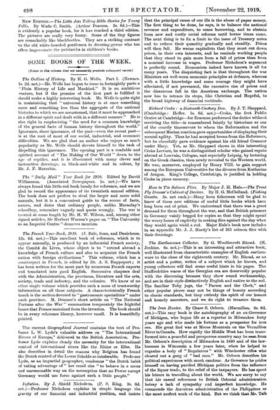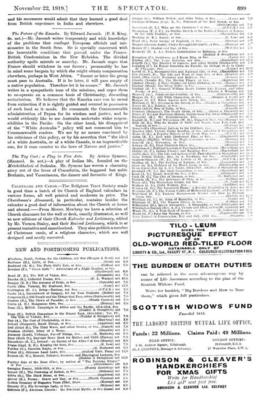SOME BOOKS OF THE WEEK.
[Notice in this column does not necessarily preclude subsequerq ravieW.1
The Outline of History. By H. G. Wells. Part I. (Newnes. Is. 2d. net.)—Mr. Wells has begun to issue in fortnightly parts a Plain History of Life and Mankind." It is an ambitious venture, but if the promise of the first part is fulfilled it should make a highly interesting book. Mr. Wells is quite right In maintaining that " universal history is at once something more and something less than the aggregate of the national histories to which we are accustomed, that it must be approached in a different spirit and dealt with in a different manner." He is also right in emphasizing " the need for a common knowledge of the general facts of human history throughout the world." Ignorance, sheer ignorance, of the past—even the recent past— is at the root of most of our social, industrial, and economic difficulties. We are glad that an author who enjoys so much popularity as Mr. Wells should devote himself to the task of dispelling this ignorance. The opening part is a readable and spirited account of " The Making of Our World " down to the age of reptiles, and it is illustrated with many clever and instructive drawings, in black-and-white and in colour, by Mr. J. F. Horrabin.
The " Daily Mail" Year Book for 1920. Edited by David Williamson. (Associated Newspapers. is. net.)—We have always found this little red book handy for reference, and we are glad to record the appearance of its twentieth annual edition. The book does not profess to rival the larger and more solid annuals, but it is a convenient guide to the scores of facts, names, and dates that ordinary people, unlike Macaulay's schoolboy, remember vaguely and quote wrongly. The war is treated at some length by Mr. H. W. Wilson, and, among other signed articles, Sir Herbert Warren's paper on " The University as an Imperial Centre "-deserves mention.
The French Year-Book, 1919. (J. Bale, Sons, and Danielsson. 12s. 6d. net.)—This excellent book of reference, which is to appear annually, is produced by an influential French society, the Comite du Livre, whose object is to " extend abroad a knowledge of French culture and also to acquaint the French nation with foreign civilizations." This volume, which has a counterpart in French, is edited by Dr. A. S. Rappoport ; it has been written for the most part by numerous French experts and translated into good English. Successive chapters deal with the Administration, the provinces, literature and the arta, society, trade and industry, and the colonies. We know of no other single volume which provides such a mass of trustworthy information on all these subjects. A characteristically French touch is the section devoted to "gastronomic specialities" under each province. M. Doumer's short article on " The National Fortune after the War " summarizes temperately the frightful losses that France sustained from the invasion. The book should be in every reference library, however small. It is beautifully printed.
The current Geographical Journal contains the text of Professor L. W. Lyde's valuable address on " The International Rivers of Europe," delivered to the British Association. Professor Lyde explaiLs, clearly the necessity for the international control of international rivers like the Rhine or Elbe. He also describes in detail the reasons why Belgium has found the Dutch control of the Lower Schelde so intolerable. Professor Lyde, as an impartial geographer, condemns " the Dutch habit of taking advantage of " her small size " to behave in a mean and unreasonable way on the assumption that no Power except Germany would use force against such a little people."
Inflation. By J. Shield Nicholson. (P. S. King. 3s. 6d. net.)—Professor Nicholson explains in simple language the gravity of our financial and industrial position, and insists that the principal cause of our ills is the abuse of paper money. The first thing to be done, he says, is to balance the national revenue and expenditure, to cease borrowing, and to abstain from new and costly social reforms until better times come. The next thing is to fix a limit to the issue of Treasury notes and to reduce their quantity gradually and steadily. Prices will then fall. He warns capitalists that they must cut down prices, in their own interests, and he reminds working people that they stand to gain more from a fall of prices than from a nominal increase in wages. Professor Nicholson's argument is perfectly sound. Economists indeed have known it all for many years. The disquieting fact is that throughout the war Ministers set well-worn economic principles at defiance, whereas with a little knowledge and some courage they might have alleviated, if not prevented, the excessive rise of prices and the disastrous fall in the American exchange. The nation now has to retrace its steps, like Christian and Hopeful, to the broad highway of financial rectitude.
Richard Croke : a Sixteenth-Century Don. By J. T. Sheppard. (Cambridge : Heifer. Is. 6d. net.)—Croke, the first Public Orator at Cambridge—for Erasmus performed the duties without receiving the title—is remembered faintly by historians as one of the courtly timeservers to whom the Reformation and the subsequent Marian reaction gave opportunities of displaying their mental agility. Thus he had accepted boons from the Reformers, but he cheerfully gave evidence against his old friend Crammer under Mary. Yet, as Mr. Sheppard shows in this interesting Croke Lecture, he was a distinguished scholar who gained repute abroad at Louvain, Cologne, and especially Leipzig, by lecturing on the Greek classics, then newly revealed to the Western world. He was, moreover, employed by Henry VIII. to gain support among the European Universities for the divorce from Katherine of Aragon. King's College, Cambridge, is justified in holding Croke in pious memory.
How to Tie Salmon Flies. By Major J. H. Hale.—The Trout Fly Dresser's Cabinet of Devices. By H. G. McClelland. (Fishing Gazette. 5s. net each.)—Many keen fishermen will be glad to know of these new editions of useful little books which have long been out of print. We understand that there was a great demand for them throughout the war, and that British prisoners in Germany vainly begged for copies so that they might spend the weary hours of captivity in making flies against the day when they would again wield a rod. Major Hale's book now includes in an appendix Mr. J. J. Hardy's list of 361 salmon flies with their dressings.
The Earthenware Collector. By G. Woolliscroft Rhead. (H. Jenkins. 6s. net.)—This is an interesting and attractive book, well illustrated from characteristic examples of English earthenware to the close of the eighteenth century. Mr. Rhead, as an artist and a potter, writes of a subject which he knows, and young collectors will find some useful hints in his pages. The Staffordshire wares of the Georgian era are deservedly popular with the discerning because they show sound workmanship, and are in their style distinctively English and native to the soil. The familiar Toby jugs, the " Parson and the Clerk," and other popular pieces may not be things of beauty according to classic standards, but they embody the spirit of our honest and homely ancestors, and we do right to treasure them.
The Iron Hunter. By Chase S. Osborn. (Macmillan. 8s. 6d. net.)—This racy book is the autobiography of an ex-Governor of Michigan, who began life as a reporter in Milwaukee forty years ago and who made his fortune as a prospector for iron ore. His great find was at Moose Mountain on the Vermillion River in Canada. How rapidly the Middle West has been transformed into a peaceful and prosperous country may be seen from Mr. Osborn's description of Milwaukee in 1880 and of the lawlessness in Wisconsin a few years later, when he helped to organize a body of " Regulators " with Winchester rifles who cleared out a gang of " bad men." Mr. Osborn describes his political experiences with muoh candour. As Governor he prides himself on having purified Michigan politics from the influence of the liquor trade, to the relief of the taxpayers. He has spent his leisure in travelling about the world. We are sorry to say that his casual references to British Colonial administration betray a lack of sympathy and imperfect knowledge. He commends the American administration of the Philippines as the most perfect work of the kind. But we think that.Mr. Taft
and his successors would admit that they learned a good deal from British experience in India and elsewhere.
The Future of the Kanaka. By Edward Jacomb. (P. S. King. 6s. net.)—Mr. Jacomb writes temperately and with knowledge of the problems that confront European officials and missionaries in the South Seas. He is specially concerned with the lamentable conditions that prevail under the FrancoBritish Condominium in the New Hebrides. The divided authority spells misrule or anarchy. Mr. Jacomb urges that France should withdraw in our favour ; presumably he has in mind some bargain by which she might obtain compensation elsewhere, perhaps in West Africa. " Sooner or later the group must pass to Australia. If it bo later, it will pass empty of a native population. Therefore let it be sooner." Mr. Jacomb writes in a sympathetic tone of the missions, and urges them to co-operate on a common basis of Christianity, discarding sectarianism. He believes that the Kanaka race can be saved from extinction if it is rightly guided and secured in possession of such land as it needs. He commends the Commonwealth administration of Papua for its wisdom and justice, and he would evidently like to see Australia undertake wider responsibilities in the Pacific. On the other hand, his disapproval of the " White Australia" policy will not commend him to Commonwealth readers. We are by no means convinced by his criticisms of this policy, or by his assertion that " the ideal of a white Australia, or of a white Canada, is an impracticable one, for it runs counter to the laws of Nature and justice."
The Toy Cart : a Play in Five Acts. By Arthur Symons. (Manned. 5s. net.)—A play of Indian life, founded on the lfrichchhakati of Sudraka. Mr. Symons has woven a charming story out of the loves of Charadutta, the beggared but noble Brahmin, and Vasantasena, the dancer and favourite of Kings.
CALENDARS AND CARDS.—The Religious Tract Society sends in good time a batch of its Church of England calendars in various forms, all well printed and moderate in price. The Churchman's Almanack, in particular, contains besides the calendar a good deal of information about the Church at home and abroad.—From Messrs. Mowbray we have a selection of Church almanacs for the wall or desk, usually illustrated, as well as new editions of their Church Kalendar and Lectionary, edited by Mr. Vernon Staley, and their .Revised Lectionary, which is at present tentative and unauthorized. They also publish a number of Christmas cards, of a religious character, which are well designed and neatly executed.







































 Previous page
Previous page